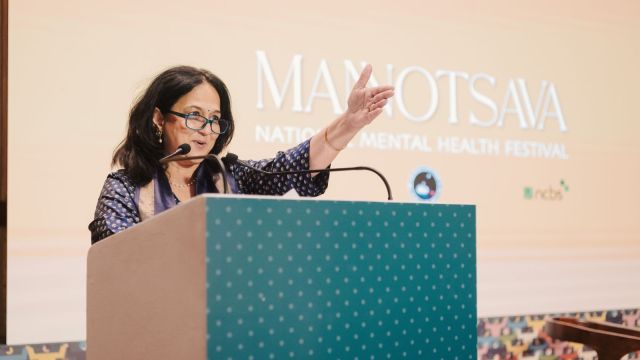Click here to join Express Pune WhatsApp channel and get a curated list of our stories
Work-life balance, healthier working cultures are a crying need today: Rohini Nilekani
Ahead of Manotsava, the national mental health festival to be held in Bengaluru on November 8 and 9, Rohini Nilekani opens up to The Indian Express about how the event aims to bring together practitioners, researchers, and NGOs to encourage discussions on mental health.
 In an email interview with The Indian Express, Nilekani says she was curious about how well workplaces were addressing employee mental health.
In an email interview with The Indian Express, Nilekani says she was curious about how well workplaces were addressing employee mental health.As Manotsava, the national mental health festival on Nov 8 and 9 at Bengaluru brings together leading voices from mental health, science, policy, art, technology and lived experience from across the country, Rohini Nilekani, noted author and Chairperson of Rohini Nilekani Philanthropies Foundation said that that work life balance and healthier working cultures were a crying need today.
In an email interview with Anuradha Mascarenhas, Nilekani said that she was curious about how well workplaces were addressing employee mental health.
Does work-life balance need a rework in current times?
“At Manotsava- the national mental health festival, we have a panel on workplace burnout where we will hear from coaches who are working with corporates on improving employee well-being. There is a diversity of approaches, but it suffices to say that work-life balance and healthier working cultures are a crying need today,” she added.
How have mental health trends changed over the past decade? How will climate change, migration or economic instability affect mental health policy planning?
While levels of well-being have improved, the Global Mind Project that tracks populations across 82 countries reported that older adults are doing better but the younger generation (18-34 years) is notably distressed. In India the last comprehensive survey was conducted by NIMHANS in 2015, but I believe post-pandemic data has now been collected and should reveal a more accurate picture for the country. Both young and old populations are affected. Among youngsters there is a rise in level of anxiety and depression which in part can be explained by the social, political, economic and technological changes. Through our work on longevity, we have found elderly suffering from loneliness and depression. There will be a need to revamp mental health policy planning in the emerging context of climate change. Youngsters especially may need a different framework of counselling services and insurance companies will have to acknowledge mental health needs arising from new anxieties.
What is the foundation’s role in supporting research on mental health?
The foundation has supported around 20 mental health focussed organisations with funding to the tune of Rs 110 crore and at the foundation supported Centre for Brain and Mind, a collaboration between NIMHANS and NCBS, several research works on severe mental illness are underway. In order to study genetic markers for five severe mental disorders, OCD, Schizophrenia, Alzheimer’s, Addiction and Bipolar disorder, NCBS and NIMHANS are developing stem-cell brains. The effort is to observe changes in biochemistry based on brains being prompted with different molecules and how individual brains respond differently to the same substance. This can shed light in the long term on how medication might be customised to suit individual needs.
Innovations like digital tools, telepsychiatry, and community programmes are emerging. How successful are they?
A diverse panel will be addressing this complex topic at the festival. However initiatives like National Tele-Manas helpline and community mental health programmes have been successful in a localised way. There are many challenges related to quality at scale, access to services and public awareness that needs to be addressed. Meanwhile there is a great potential for collaborations between government and civil society and platforms like Manotsava hopes to enable that.
What does the festival aim to achieve?
The festival is a unique partnership between my foundation and two national institutions. The aim is to bring science and clinical expertise related to mental health out into the public domain. By offering this space we hope to create awareness about topics related to mental well-being, strengthen the public discourse around this important topic, spur collaborations between practitioners, researchers, funders and NGOs and bring people together to experience community, joy and hope.
Click here to join Express Pune WhatsApp channel and get a curated list of our stories








